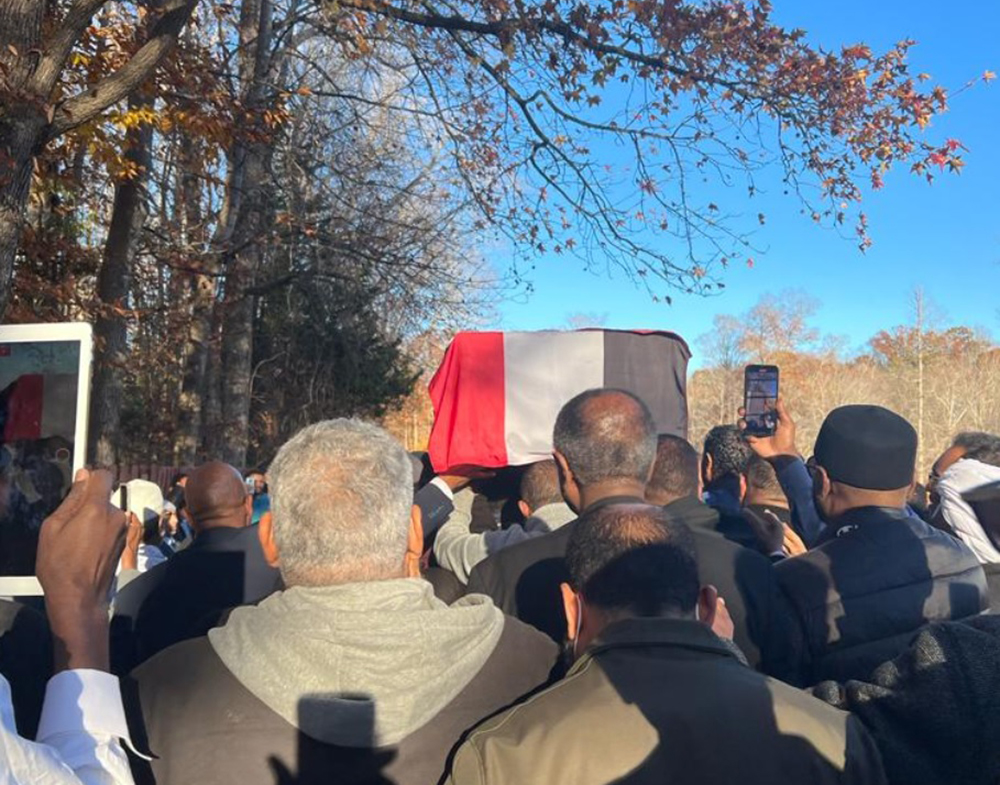
Wad Al-Amins Departure in the Time of War, the Multiplying Grief
Al-Zain Osman
The Sudanese artist Mohammed Al-Amin, with a creative experience spanning over sixty years, passed away far from the homeland where he had always ascended above its stages and traversed all its cities, carrying his oud, spreading joy and music. He closed his eyes for the last time in a hospital in Philadelphia, USA.
With the death of artist Mohammed Al-Amin, the Sudan after his departure will not be the same as the Sudan before him. His departure marks the end of an entire era in Sudanese creative history, a period where the protagonists were Mohammed Al-Amin, Mohammed Wardi, and Abdel Karim Al-Kabli—a period of singing for the beloved homeland and the revolution, the 1960s.
Mohammed Al-Amin Hamad Al-Nil Al-Azraq, born in Wad Madani in central Sudan in 1943, arrived in the capital, Khartoum, in 1959 to record his songs on the radio. However, he returned to Wad Madani before settling in Khartoum again.
"Death does not hurt the dead; death hurts those who remain alive." This text applies perfectly to the situation following Wad Al-Amins departure. What adds to the pain is that the Sudanese pioneer artist died far from his homeland. His departure is more sorrowful because a star like him dies in a time of war and is not mourned in his country. He dies without the crowds he sang their dreams and pains for, without the soil of the country he loved and reciprocated the affection of its people. The grief is that the country itself has turned into a grand funeral due to the war.
On Tuesday, amid a solemn gathering of Sudanese in the United States, the funeral ceremony of the late artist Mohammed Al-Amin took place. The funeral prayer was performed at the Migration Mosque before his body was laid to rest in the Stanford cemetery. Mourners chanted slogans and takbirs. Wad Al-Amin was buried in America after his homeland became too constricted for him. The war deprived millions of the opportunity to follow his funeral in the streets of Khartoum and welcome him at Khartoum Airport, parallel to the Officers Club stage where Abu Al-Amin embellished Sudanese nights with his concerts. Mohammed Al-Amin died without giving his admirers the chance to bid him farewell properly, as happened to other artists, especially since the value of people and their creativity in Sudan becomes apparent on the day of their departure, locally known as "Farewell So-and-so Day."
In war, the available spaces for conducting war never shrink. In war, even cemeteries shrink. Not because of bodies piling up due to death but because Sudans cemeteries have become difficult to access due to the war. Due to the war, many were forced to bury their dead inside or in front of their homes. The road to the cemeteries is no longer open as it was in previous times, which also applies to the feet that accompany those they love.
The vast Sudan accommodated Wad Al-Amin in his lifetime, with hardly a city that did not echo his voice. His voice barely left a place selling drinks in Nyala market, west Sudan, until it settled in another place selling food in Kassala, the far east. Wad Al-Amins songs could be heard in public transportation. Café owners sold people juices and sandwiches with Wad Al-Amins song "Zaad Al-Shujun."
Despite this vastness, the same country that Wad Al-Amin loved for and revolutionized felt too confined to provide him with a small place to sleep. It is as if he affirms a line from the late poet Mohammed Hassan Salem Hameeds elegy for another Sudanese artist, Mustafa Saeed Ahmed, who passed away in Doha: "My days are preoccupied with him, and yet he remains a homeland, even though the West gave you death and abundance shrouded you in a shroud."
Before the death of artist Mohammed Al-Amin, the journalist, poet, socialist, and member of the Central Committee of the Communist Party, Kamal Al-Jazouli, also passed away in Cairo, where he was buried without finding a spot in Omdurman. This confirms a fundamental hypothesis that war opens the doors to death and closes the paths to graves.
Wad Al-Amin left in America, at a time when his spirit "craved" Wad Madani, Khartoum, and its streets, longing to rest among the hands that always waved to him in gratitude while he was on stage, or those that waved to him with love as he walked the roads. He is buried in America, dreaming of sleeping anywhere in his country after people follow him there. He is aware that Philadelphia and its graves are not like the Farouk graves in Khartoum, where his creative companion in the epic, artist Mohammed Wardi, rests.
The war will end, and after that, Wad Al-Amins remains can be moved to his homeland. The lingering question is, will his admirers find the same homeland he sang about? They, who, at the hour of his departure, sang that Khartoum lost its security, and with Wad Al-Amins death, it lost its joy.

